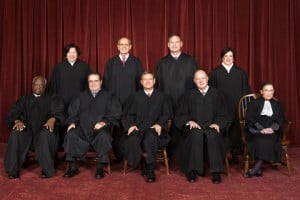The U.S. Supreme Court today was asked to hear a cased filed by a gay Alabama mother who is being shut out of seeing her three children though she has raised them since birth, because Alabama won't recognize a same-sex-parent adoption from another state, Georgia.
The question being asked of the court is whether Alabama violated the Full Faith and Credit clause of the Constitution by choosing to ignore the Georgia court's adoption ruling.
 The National Center for Lesbian Rights, by whom the mother, named only as V.L., is represented, explains the case:
The National Center for Lesbian Rights, by whom the mother, named only as V.L., is represented, explains the case:
Today, a lesbian mother in Alabama asked the U.S. Supreme Court to review an Alabama Supreme Court decision refusing to recognize her as an adoptive parent of her three children and holding that Alabama does not have to recognize second-parent adoptions granted by Georgia courts. The mother also asked the Supreme Court for an emergency order permitting her to visit her children while her appeal is pending. As a result of an earlier Alabama order, she has not had visitation with her children—ages 12, 10, and 10—for nearly seven months, even though she has raised them from their birth.
In her request, V.L. the adoptive mother, notes that the Alabama Supreme Court's decision is unprecedented. Before this ruling, no state supreme court has refused to recognize a same-sex parent's adoption from another state—or any out-of-state adoption—based on a disagreement with how the court issuing the adoption interpreted its own adoption laws. Under the United States Constitution's Full Faith and Credit Clause, states are required to respect court judgments, including adoption orders, issued by courts in other states. V.L.'s request says “this Court's review of the Alabama Supreme Court's decision is urgently needed” because “the Alabama Supreme Court's decision flouts a century of precedent on the Full Faith and Credit Clause and will have a devastating impact on Alabama adoptive families.”
V.L and E.L. were in a long-term same-sex relationship in which they planned and raised three children together, using donor insemination. To ensure that both had secure parental rights, V.L., the non-biological mother, adopted the couples' three children in Georgia in 2007, with E.L.'s support and written consent. When the two later broke up, E.L. kept V.L. from seeing the children, fighting her request for visitation, and arguing that the Georgia adoption was invalid in Alabama, where they live.
On September 18, 2015, the Alabama Supreme Court issued an order refusing to recognize V.L.'s Georgia adoption and declaring that it is “void.” Even though V.L. raised the children from birth and both women participated in the adoption hearing and consented to the adoption, the Court broke with more than a century of precedent requiring states to honor court judgments from other states. Disregarding this clear precedent, the Alabama Supreme Court ruled that Alabama can treat the adoption as void based on the Alabama Supreme Court's view that the Georgia court should not have granted the adoption in 2007.
Although the Alabama Supreme Court said it was not reaching the merits of Georgia's decision, the petition said there was reason for concern about the court's motivations.
Earlier this year, it told Alabama officials not to issue same-sex marriage licenses, despite a federal court's decision that the state's prohibition was unconstitutional.
And one of the justices in the majority in the adoption case noted that Alabama “has a legitimate interest in encouraging that children be adopted into the optimal family structure, i.e., one with both a father and a mother.”



